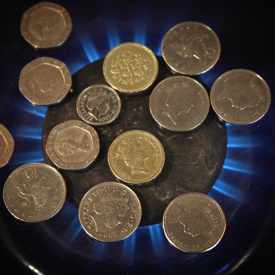Energy firms’ profits soar
As energy companies are set to make £125 profit per customer each year, up from £15 in June, Ofgem introduces a simplified tariff allowing like for like comparison.
Industry regulator Ofgem said that the average dual-fuel bill has increased by £175 and that the average annual bill will be £1,345 by November.
Wholesale prices have risen by 40 per cent over the past year to £115 per customer, and could increase over the winter months. Energy firms have blamed a rise in wholesale prices and an increased dependence on imports.
Prices are expected to subside next year, but the energy market is still being stifled by complex pricing structures, poor behaviour by suppliers and a lack of transparency, said Ofgem.
The regulator is bringing in a series of reforms to the energy market to make it easier for customers to compare prices between companies.

Simplified standard tariff
The first of these is an introduction of a simplified standard tariff based on a simple unit price for energy used and a standing charge, set by the regulator.
Ofgem said that bills which show a clear breakdown of unit costs will allow consumers to compare price difference between different companies.
It’s not good enough to tell people to shop around. We need fundamental reform of the energy market, to break the stranglehold of the Big Six. Caroline Flint, Labour
Standard energy supply contracts and more complex deals will also be more transparent, and Ofgem’s plan will allow customers who choose a more complex deal to be protected against price increases for the duration of their contract.
Ofgem chief executive Alistair Buchanan said that a “radical break” with the past was needed.
“When consumers face energy bills at around £1,345, they must have complete confidence that this price is set by companies competing in a fully-competitive market. At the moment that is not the case,” he said.
Read more: A quarter of families face fuel poverty by 2015
Fundamental reform needed
Labour said that while utility companies are enjoying soaring profits, millions of families are struggling with energy bills. Caroline Flint, the shadow energy and climate change secretary said that the government needed to “get a grip” on energy bills by making crucial change to the current energy market.
“It’s not good enough to tell people to shop around. We need fundamental reform of the energy market, to break the stranglehold of the Big Six, allowing new entrants, increasing competition and driving down energy bills for families,” she said.
Labour’s proposed solution to rising utility costs, is to make providers pool their energy and allow any company to buy it and sell it on to customers.
The major companies currently generate energy and then also sell it to households. Labour says its proposals would break up the existing market, allowing smaller companies to get involved and resulting in more competitive prices for consumers.
75 per cent of people just stick with their old energy company through thick and thin. People think companies reward loyalty but they don’t. Jenny Driscoll, Which?
Earlier this week, Scottish & Southern Electricity (SSE) announced plans to sell all of its electricity on the “day-ahead” open market, in line with Labour’s proposals.
SSE is one of the Big Six energy companies, along with Scottish Power, RWE npower, Centrica, E.ON and EDF Energy.
Competition is good for consumers
The predominance of the Big Six companies puts consumers at a disadvantage, said Jenny Driscoll, energy campaigner at consumer watchdog Which?
“We do think it’s important that there is more competition,” she told Channel 4 News. “75 per cent of people just stick with their old energy company through thick and thin. People think companies reward loyalty but they don’t.”
Which? welcomed Ofgem’s proposals to make bills more transparent, saying that deciphering bills is the primary complaint among consumers. As part of an investigation into energy companies, the consumer champion recently asked 40 people to decipher their utility bills and only one person was able to break down the costs.
Consumers would get the best deal from shopping around and changing provider regularly, said Ms Driscoll. “However 40 per cent of people who do switch go to a more expensive tariff because they haven’t understood what they’re moving on to,” she added.
-
Latest news
-
Laughing Boy: New play tells the tragic tale of Connor Sparrowhawk5m

-
Sewage warning system allows some of worst test results to be left off rating system, analysis shows3m

-
Post Office inquiry: Former CEO didn’t like word “bugs” to refer to faulty IT system4m

-
Israeli soldier speaks out on war in Gaza12m

-
PM’s defence spending boost should be ‘celebrated’, says former Armed Forces Minister4m

-




